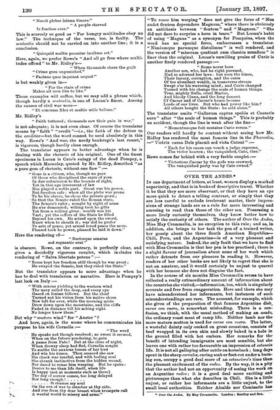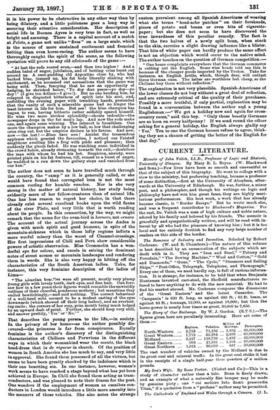OVER THE ANDES.* IN one department of letters, at least,
women display a marked superiority, and that is in books of descriptive travel. Whether it be that they are more observant, or that they have an eye more quick to detect a telling contrast, or simply that they are less careful to exclude irrelevant matter, their impres- sions of strange lands are as a rule far more interesting and amusing to read than those of the other sex. Possessing a more lively curiosity themselves, they know better how to satisfy the curiosity of others. The author of Over the Andes, Miss May Crommelin, is no exception to this rule; and as, in addition, she brings to her task the pen of a trained writer, her gossip about the three South American Republics— Chili, Peru, and the Argentine—is of a very pleasant and satisfying nature. Indeed, the only fault that we have to find with Miss Crommelin is that her pen is too practised ; there is a slight flavour of journalism about some of her work which rather detracts from our pleasure in reading it. However, readers of her other books are not likely to regret that she is not an amateur, and it would certainly be unjust to quarrel with her because she does not disguise the fact.
In the course of six months Miss Crommelin seems to have collected a really extraordinary amount of information about the countries she visited,—information, too, which is singularly accurate and free from exaggeration. Here and there she may have misunderstood her informants, but instances of such misunderstandings are rare. The account, for example, which she gives of the preparation of that famous Argentine dish, earns con cuero, is somewhat misleading. There is a con- fusion, we think, with the usual method of making an asado, the ordinary roast meat of camp life. Neither lamb nor the more mature mutton is used for came con cuero. The latter, a wasteful dainty only cooked on great occasions, consists of beef wrapped in its own skin and slowly baked in a hole in the ground filled with hot embers. Her remarks for the benefit of intending immigrants are most sensible, but she leaves one with rather too favourable an impression of estancia life. It is not all galloping after cattle on horseback ; long days spent in the sheep corrales, curing scab or foot-rot under a burn- ing sun, occupy a good deal more of an estanciero's time than the pleasant excitement of the rodeo. By the way, it is a pity that the author had not an opportunity of seeing the work on an Argentine rodeo ; it is a good deal more exciting and picturesque than what she describes in Chili. She is a little unjust, or rather her informants are a little unjust, to the small local authorities. Neither Alcalde nor Comisario has
• Oen the Andes. By May Crommelin. London Bentley and Ben. it in his power to be obstructive in any other way than by being dilatory, and a little politeness goes a long way in
securing their attentive consideration. Her description of social life in Buenos Ayres is very true in fact, as well as bright and amusing. There is a capital account of a match
at Pelota, a game not unlike "fives" on a large scale, which is the source of more sustained excitement and frenzied betting than even horse-racing. The author seems to have thoroughly caught the spirit of the scene, as the following quotation will prove to any old aficionado of the game :— "At last the reds scored even,—and then two higher ! And a sudden babel of anger, jubilation, and of betting cries burst out around us. A suet-pudding old Argentine close by, who had backed blue, jumped up, his fat body literally shaking with excitement, as be screamed out accusations that the game was being sold. Then, fancying that he saw an opportunity of hedging, he shrieked below, Yo doy diez pesos—yo doy—yo cloy V (I give ten dollars7I give !). But no one heeding him, he relapsed in disgusted bitterness of spirit into his seat, and, unfolding the evening paper with trembling hands, pretended that the vanity of such a miserable game had no knger the least interest in life for him. But see ! the blue champion has begun to run, having hitherto rather selfishly spared himself. He wins two more strokes splendidly—shouts redouble—the newspaper drops in the fat man's lap. And now the reds make one, and again seem winning. The interest is breathless. One more the champion makes by a low ball, so low that challenging cries ring out, but the umpires declare in his favour. And now, now — the last ! — Blues have won ! Amidst the tremendous applause which greeted the favourites, I noticed our Falstaff neighbour swelling like a frog with pride and pleasure ; then
suddenly the gleam faded. He was watching some individual in the crowd below, already streaming towards the exit,—doubtless the man with whom he had his bet. Suspicion, anxiety, were printed plain on his fat features, till, roused to a burst of anger, he waddled in a run down the gallery steps and vanished from our ken."
The author does not seem to have travelled much through
the country, the " camp " as it is generally called, or she would have found that corrugated iron is not the most common roofing for humble ranchos. Nor is she very
strong in the matter of natural history, her study being evidently more of her fellow-creatures than of animal life. One has less reason to regret her choice, in that there
already exist several excellent books upon the wild fauna of the river Plate, and very little that is worth reading about its people. In this connection, by the way, we might remark that the name for the oven-bird is horn.ero, not ornaro
The account of the actual journey across the Andes is given with much spirit and good humour, in spite of the
mountain-sickness which in those lofty regions inflicts a
more woeful misery than the worst of Channel-crossings. Her first impressions of Chili and Peru show considerable powers of artistic observation. Miss Crommelin has a won- derful eye for colour, and excels in seizing the dominant notes of street scenes or mountain landscapes and rendering them in words. She is also very happy in hitting off the
characteristics of the South American ladies. Take, for instance, this very feminine description of the ladies of Lima— "The .i.imeiian beaLlles were all present, mostly very plump young girls with lovely teeth, dark eyes, and fine hair. One fore- saw how in a few years their figures would resemble the unwieldly outlines of their cheerful, ponderous mothers ; but meantime they smiled bewitchingly,—and said nothing. The correct behaviour of a well-bred ?till(' seemed to be a modest casting of the eyes downwards (which showed off their long lashes), and an everlast. ing smile ; the corners of her rosy, prim mouth being much helped by an upward dash of paint. Further, she should keep very still, and answer prettily, 'Yea' or 'No."
That describes the young person to the life,—in society. In the privacy of her home—as the author possibly dis- covered—the primness is far from conspicuous. Equally feminine is the author's discovery of the distinguishing characteristics of Chilians and Peruvians in the different
ways in which their womankind wear the manta, the black head-dress that is de rigueur in church. Of the position of
women in South America she has much to say, and very little in approval. She found them possessed of all the virtues, but seems to have been greatly shocked by the indolence which is their one besetting sin. In one instance, however, woman's work seems to have reached a stage beyond what has yet been achieved in Europe. In Chili she found them acting as tram- conductors, and was pleased to note their fitness for the post. One wonders if the employment of women as omnibus con- ductors in London would introduce a little more amenity into the manners of those vehicles. She also notes the strange custom prevalent among all Spanish Americans' of wearing what she terms "head-ache patches" on their foreheads, pieces of potato and beans or even bits of cigarette- paper ; but she does not seem to have discovered the true inwardness of this peculiar remedy. The fact. is that the two halves of a newly split bean, when stuck to the skin, exercise a alight drawing influence like a blister. That bits of white paper can hardly produce the same effect is not an objection which would occur to the native mind. The author touches on the question of German competition :—
"One hears complaints everywhere that the German commerce is cutting out the English. Some wise heads told me this is because of the cheaper goods imported by the Teuton. Take for instance, an English kettle, which, though dear, will outlast three German ones. The latter are worthless but cheap, so the Chilians buy them without reflection."
The explanation is not very plausible. Spanish-Americans of the lower classes do not buy without a great deal of reflection, and are extremely critical of the quality of their purchases.
Possibly a more truthful, if only partial, explanation may be found in a conversation between the author and a young Englishman:—" We get a holiday now and again for cross-
country races," said this boy. "Only those beastly Germans are so keen on every halfpenny ! If we send round the officer asking for a general holiday, the English always gladly say Yes.' Ten to one the German houses refuse to agree, think-
ing they see a chance of getting the better of the English for that day."



































 Previous page
Previous page